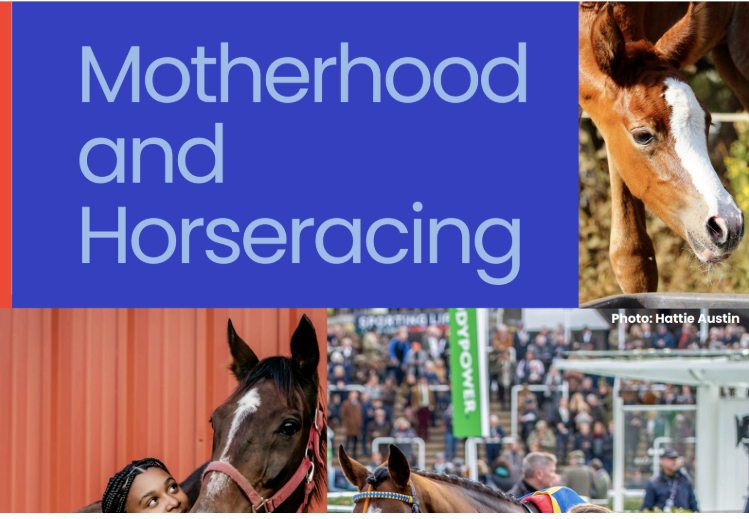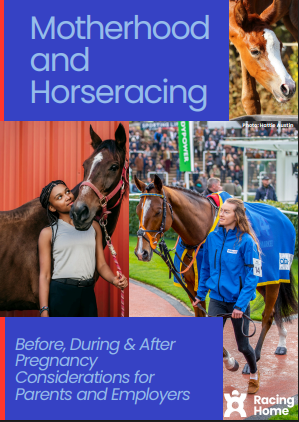This Is What Retention Looks Like

Racing Home and Women in Racing today announce the publication of a new handbook for both employees and employers in the sport of horseracing, focused on supporting parents to remain within the industry—and retain the knowledge that keeps it running.
You can’t teach what some women in this industry know.
You can’t run a course on instinct. You can’t fast-track resilience. You can’t simulate what it means to hold a horse’s history in your body—because you’ve worked with them every day, through every season, across years of highs, lows, setbacks, recoveries, wins.
That’s the kind of knowledge that keeps this industry standing. And we’re losing it.
Not because women can’t stay. But because we make it harder than it needs to be when they become mothers.
The Racing Home Motherhood & Horseracing Handbook is a direct response to that. It isn’t a polite gesture. It’s a professional asset. A toolkit that speaks to the structural gap between what women offer—and what they’re given in return.
It doesn’t patronise. It doesn’t generalise. It lays out what’s needed if the racing industry is serious about retention, wellbeing and excellence. It provides clear, legally-backed information on maternity rights and flexible working. It explains how to structure a phased return in a fast-paced environment. It gives both employers and employees tools to plan ahead—not react late.
It includes:
- Employment law basics that still aren’t universally understood or applied
- Templates for return-to-work plans, job shares, schedule adjustments
- Recovery timelines that acknowledge the physicality of equine work
- Wellbeing signposts to mental health resources and industry support
- Real testimonies from women working in every part of the sport
These aren’t abstract suggestions. They are usable, readable steps that could stop a seasoned member of staff from quietly stepping away.
And that matters—because education matters. But not on its own.
This industry talks a lot about training. Rightly so. We run apprenticeships, qualifications, development programmes. But it’s only half the equation. If we don’t value lived experience with the same urgency, we’re setting ourselves up to train and lose in the same breath.
When a woman has built ten or twenty years in this game, she becomes more than her job title. She becomes a carrier of context. The one who notices changes others miss. The one who knows which horse can be trusted in which box, which farrier to call in what situation, which rider needs a quiet word rather than a formal chat. That knowledge doesn’t come from a textbook. It comes from time. From proximity. From care.
And yet, so many women are still forced into the same dilemma: choose the job or choose your child. Be everything at work, or be everything at home. But don’t expect to hold both.
What tools like this handbook—and resources like The Equestrian Motherload—say loud and clear is: that’s a false choice.
We don’t have to keep losing mothers to inflexible systems.
We don’t have to pretend that a temporary change in schedule is an unsolvable problem.
We don’t have to keep resetting the learning curve because we let go of the person who had already climbed it.
We can do better. And now, we have the frameworks to back it up.
At Equitas, we’ve seen what happens when women are given both support and respect. They don’t just return—they lead. They mentor. They evolve the systems they re-enter. And they pass down not just information, but confidence. Quiet, earned confidence that says: I’ve been here before. I know what matters.
This is the future we want to build. Where knowledge isn’t wasted. Where education and experience aren’t in competition—they’re in combination.
The Racing Home Motherhood & Horseracing Handbook is a line in the sand. It says: we can’t keep pretending this is someone else’s issue. If you work in or alongside racing, this affects you. Whether you manage teams, run yards, oversee scheduling, or ride yourself—this is your business.
Because women aren’t stepping away due to lack of ambition. They’re stepping away because no one made a plan. No one asked the right questions. No one built the right return ramp.
That can change. Starting now.
So download the handbook. Read it. Share it.
Then act on it.
Because if we want the future of this sport to be sustainable, women’s knowledge—both learned and lived—has to be held, not lost.



